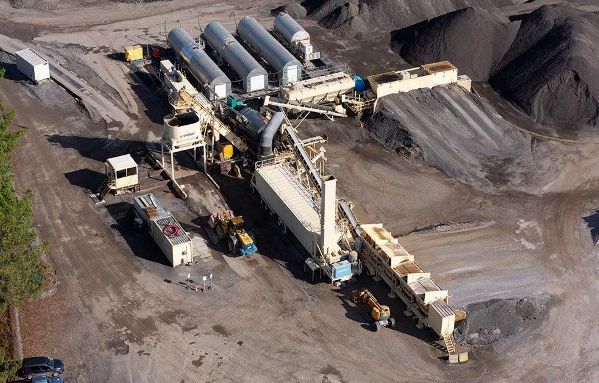Their sudden irruption into the debate makes them the surprise guests of an already sprawling issue. Two asphalt production plants will be “temporarily” installed along the route of the A69 between Castres and Toulouse. One must be installed in Villeneuve-lès-Lavaur, on the border of Tarn and Haute-Garonne – not very far from the famous Camping des Platanes, once the opponents’ HQ -, the other in Puylaurens. Responsible for providing the surfacing of the 53 kilometers of motorway, they must “run” for a maximum of 12 to 18 months, including six months intensively at the start of 2025, before disappearing.
These mini bitumen plants, which look more like quarries, do not fall from the sky. They were well buried in the thousands of pages of the file submitted by the Atosca dealer and validated by prefectural decree. “But who has read the entire 16,000 pages of the file?” asks a resident of Loubens-Lauragais, who wishes to remain anonymous. I even saw mayors of villages concerned who were not aware.” But that was before. “Now I can tell you that parents of students in the area are up in arms and that residents who did not necessarily have an opinion on the A69 are worried,” continues this local resident.
“Fight battle”
And in this corner where the Autan wind is omnipresent, doubt has spread. To the point that a new collective – yet another – against the A69 was born. It is called “Lauragais without bitumen” and held its first public meeting this Thursday evening in a small local village hall. The questions are numerous: “What guarantees that the fumes from the bitumen plants will not be toxic, when that of Puylaurens will be 1.2 km from the village and the school of Saint-Germain-des- Close ? What insurance for neighboring organic agricultural plots? » says a spokesperson for the young collective, whose members are currently documenting themselves, determined to “fight the battle. »
A new front for Atosca, the concessionaire chosen by the State for the construction of the motorway between Castres and Toulouse. And a new hot topic to defuse while several “squirrels”, defenders of trees, are on hunger strike and the best known of them, Thomas Brail, announced that he also planned to launch this Monday, October 9 in a dangerous “thirst strike” if the construction site continues.
Essential oils to mask the smell
Concerning the power plants, Atosca assures that it wants to be completely “transparent” and wants to be “reassuring”. First by doing a semantic reminder. “These are not tar factories, the latter has been banned since the 1980s, but “mixture production plants”, composed of a mixture of gravel, sand, fines and bitumen used as a binder,” explains the company. It also ensures that the installations will comply “strictly with the regulations in force on air quality”.
On the establishment of these temporary sites, she even puts forward an ecological argument. They will be located near two future interchanges, with direct access to the site. The 500,000 tonnes of asphalt produced will therefore be injected hot onto the highway and “there are 20,000 trucks that will not be circulating in the sector to transport them”. Atosca recognizes, however, that a “nuisance may remain”: the odor, “depending on the weather and the winds”. If it becomes “really annoying”, the dealer thinks of a “palliative”: “a box [placé dans le conduit de la cheminée de la centrale] which diffuses, in the form of dry steam, a mixture of essential and natural oils. Not enough to restore the zenitude of the members of Lauragais without asphalt. Above all, they remember that, no longer in Toulouse, residents of the Gragnagne asphalt plantclosed since this summer, have filed “200 complaints” for nuisance with state services.

